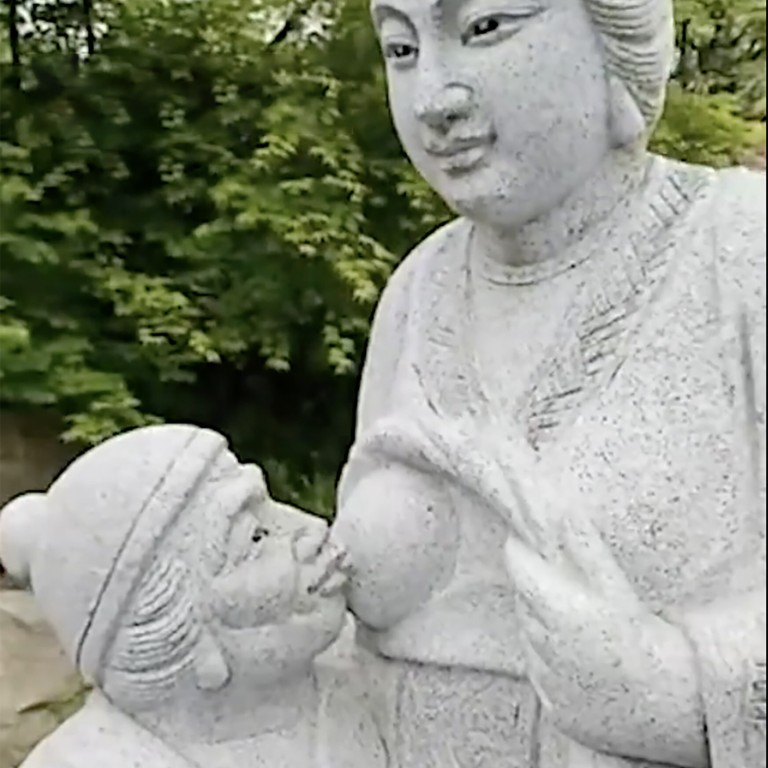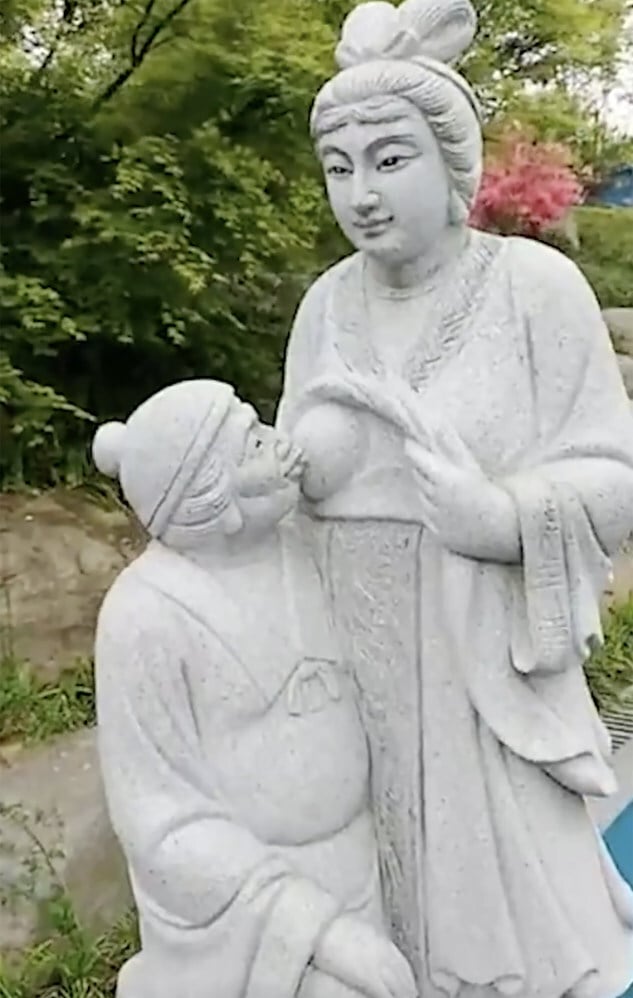
Statue in China of woman breastfeeding elderly mother-in-law removed after public outcry
- The park initially defended the statue by saying: ‘The one who made the complaint was young and didn’t know filial piety’
- The statue was then removed after public outcry spread online
A statue of a woman breastfeeding her mother-in-law has been removed from a park in eastern China after a public backlash.
The Yingpanshan Park in Huzhou, Zhejiang province told the Xi’an Business Times that after the controversy, authorities stepped in and the park was told to remove the statue.
The statue shows a vivid image of a woman, dressed in ancient costume, lifting up her shirt to expose one of her breasts. An elderly woman sits next to her, suckling from her teat.
“In the modern world, can you imagine a woman breastfeeding her in-law?
A tourist who spotted the statue last week complained to the park. Pictures and videos of the statue have spread online, with many criticising it as inappropriate.

The park had previously responded saying: “The one who made the complaint was young and didn’t know filial piety”.
Park staff claimed that the statue was based on an act from The Twenty-four Filial Exemplars, a book used to teach Confucian moral values on filial piety written by Guo Jujing during the Yuan dynasty (1260-1368).
‘Waste of money’ giant statue of Chinese general to be moved for US$23.8 million
“If we don’t allow showing the 24 filial pieties, then where would Chinese filial values lie?” the park initially argued.
In the book, the woman breastfeeding her mother-in-law is allegedly based on the true story of the grandmother of Cui Shannan, an official in the Tang dynasty (618-907). Her mother-in-law had lost all her teeth due to old age so the woman fed her from her breast every day to keep her healthy.
However, public opinion strongly disagreed, saying the behaviour depicted clashed with modern-day values.
“In the modern world, can you imagine a woman breastfeeding her in-law? It makes people uncomfortable and misleads the children,” one said on Weibo.
“We do not have to follow everything in our tradition, we can keep what’s good and disregard the rest,” another said.
The concept of filial piety had played a strong role in Chinese culture in ancient times. Besides being filial to parents, the ruling class called for filial piety to the ruler, with a saying that “When a ruler wants a subject to die, the subject must die; when a father wants a son to die, the son must die”.
However, some stories in the book are now regarded as negative and inappropriate. These include the extreme example of Guo Ju, a man who lived in the eastern Han dynasty (25-220), who was said to be extremely filial to his mother. After his father died, his family became poor and he was worried that he could no longer feed his mother, and decided to kill his son to provide food to his mother.
“We can have another son, but we can’t have another mother,” he told his wife.
While they were digging a pit on the ground to bury their son, they found a jar of gold, which was said to be their reward from the gods.
Another example is a man who was told by his doctor that if his father’s faeces tasted bitter, that means his father’s illness was receding. The man then tasted it and found it to be sweet, he was worried and prayed to the gods to heal his father.
Renowned writer Lu Xun has criticised the story of Laolaizi in the book as “an insult to the ancients, and a bad influence on future generations”. It talked about a man in his 70s, who dressed up as a child and pretended to fall on the ground and cry to amuse his parents.

.jpg?itok=H5_PTCSf&v=1700020945)